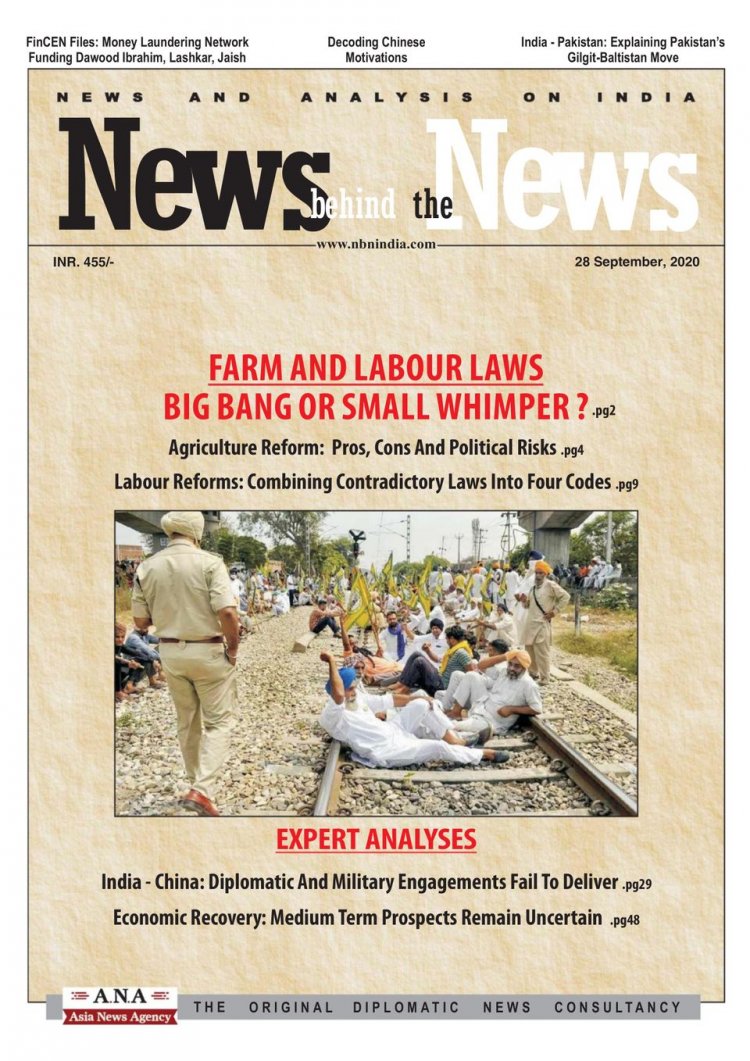FARM AND LABOUR LAWS: BIG BANG OR SMALL WHIMPER ?
Amulya Ganguly

Amulya Ganguli
Narendra Modi’s election victory in 2014 was based not on the peddling of his party, the BJP’s Hindutva ideology, but on the projection of himself as a pro-business leader who would accelerate economic growth and reduce unemployment.
Noted economists like Jagdish Bhagwati hailed Modi’ s ascent to power as the best thing that had happened to India in recent years, especially after the inability of his predecessor, Manmohan Singh, to push through market-oriented policies because of the hurdles put up by the “socialist” Congress president, Sonia Gandhi, and the Left-leaning National Advisory Council led by her.
The pro-market economists were waiting, therefore, for Modi to complete what Manmohan Singh had started in 1991 but could not finish. There were eager expectations about the announcement by Modi of “big bang” reforms among businessmen in India and abroad.
But they never materialized, Instead, there were instances of what was called “incremental progress” – the building of public toilets, the supply of subsidized cooking gas to the poor, the opening of small deposit bank accounts – although Modi himself said that what India needed was a “high jump” and not tiny steps.
Some commentators ascribed Modi’s backing away from the high jump to Rahul Gandhi’s jibe about the government being beholden to the suited-and-booted capitalists. “Suit-boot ki sarkar”, the Congress leader had said about the government.
Has Modi finally decided to shed that uncomplimentary tag ? If his government’s latest policies on agriculture and labour are concerned, they show a distinct pro-market tilt. But this is exactly what has riled his opponents outside and inside his charmed circle, for even the BJP’s alliance partner, the Akali Dal, has decided to oppose the farm policies with the minister for food processing industries, Harsimrat Kaur, resigning.
If thousands of Sikh farmers – the Akali Dal is primarily a party of the Sikhs of Punjab – descend on Delhi with their tractors, and if they organize a prolonged “rail roko” (stop the trains) campaign, the government will be in a quandary, not least because of the fear of violence which is always possible when so many disgruntled people take to the streets.
There are two main grievances of the farmers. One is the virtual elimination from the agricultural scene of the arhatiyas or middle men who were usually the first buyers of the farm produce. Now, the farmers will have to sell their grains wherever is convenient for them – at the farm gates or warehouses or cold storages.
However, although the arhatiyas have the reputation of buying cheap from the farmers and selling dear in the market, they cannot always be dismissed as exploiters, for the social relationship is somewhat more complex. As a farmer said on TV, the arhatiyas are “our ATMs” who provide ready cash at times of need. Besides, in their absence, the farmers will have to undertake the cost of transporting the grains to wherever they get the best price.
But this is a less important reason for the protests. The main fear is that as the “one nation, one market” concept takes root, it will gradually lead to the closure of the mandis or the traditional markets where the buyers and sellers operate at present.
Initially, it may be profitable for the farmers to sell to the highest bidder. But, over time, there is the possibility of the business magnates beginning to control the market. The farmers fear that in that eventuality, they will become even more dependent on the corporate sector than they are on the middle men.
It is to avoid such a possibility that they want an assurance on the continuation of the provision of Minimum Support Price (MSP) which the government now pays to buy their produce. Their apprehension is that under the new law, the MSP will disappear as the market rules begin to prevail. Even the RSS-controlled Bharatiya Kisan Sangh wants a guarantee that the MSP is incorporated in the new law.
If the MSP has become an issue despite the government’s assurance that it will not be touched, the apparent reason is that the government is not fully trusted because of its suspected proximity to the moneybags. It is not only in the agricultural sector that the “suit-boot ki sarkar” sneer is haunting the government. It is the same in the case of the new labour laws.
For instance, the need for the government’s permission to shut down a loss-making establishment or dismiss workers will no longer be applicable to factories employing up to 300 people instead of 100 as at present. The American-style process of hiring-and-firing, which has long been a dream of owners, is now available to the small and medium industries.
Along with it has been introduced the so-called fixed-term employment under which the workers can be hired for a limited period beyond which the employers will have no obligations such as providing gratuity, provident fund, etc. This is another measure which is a favourite of the corporate sector. The trade unions, however, see it as the “casualization” of labour which does away with the idea of a permanent job.
Like the RSS-led Kisan Sangh’s reservations about the farm laws, the Mazdoor Sangh, which is also affiliated to the RSS, is uneasy about the labour laws. In India, cozying up to businessmen can be politically inconvenient, mainly because the latter do not have a sterling reputation. While they are suspected of surreptitiously providing money to the powers-that-be, no politician would like to be seen hobnobbing with them in public.
Yet, the thriving of the corporate sector is a must for generating employment. The new laws are expected to serve this purpose if the misgivings among farmers and workers are removed. Otherwise, it is a tight-rope walk for the government between Big Bang reforms and a whimpering incrementalism.
















